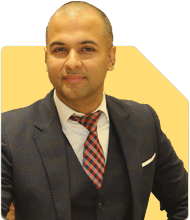Harsh Bharwani | Answer |Ask -Follow
Entrepreneurship Expert - Answered on Oct 19, 2023
As CEO and managing director, he leads the international business and employability initiatives at the computer networking institute, Jetking Infotrain Limited.
After graduating from Delhi University, Bharwani joined the family business in 2010 and set up operations in the US and Vietnam.
He has trained over three lakh students in employability, confidence and key life skills.... more

what is the career scope in business marketing
Marketing Management: This is a common career path for business marketing professionals. Marketing managers are responsible for developing marketing strategies, managing teams, and overseeing marketing campaigns to promote products or services to other businesses.
Product Management: Product managers work on developing and managing the products or services that a company offers to other businesses. They often collaborate with cross-functional teams to ensure products meet market needs and generate revenue.
Marketing Strategy: Marketing strategists or consultants work on crafting marketing plans and strategies for businesses. They may provide recommendations on market research, branding, positioning, and promotional activities.
Digital Marketing: In the digital age, online marketing is crucial for businesses. Digital marketing specialists focus on online channels such as social media, content marketing, email marketing, and search engine optimization (SEO) to reach B2B audiences.
Content Marketing: Content marketing involves creating valuable and relevant content to attract and engage B2B audiences. Content marketers often work on blog posts, whitepapers, eBooks, webinars, and other content assets.
Market Research and Analysis: Market researchers collect and analyze data to understand market trends, customer behavior, and competitors. They provide insights that help businesses make informed marketing decisions.
Business Development: Business development professionals work on identifying and pursuing new business opportunities, partnerships, and collaborations. They often play a crucial role in expanding a company's customer base.
Trade Show and Event Management: Managing trade shows and industry events is another area within business marketing. Professionals in this role plan, coordinate, and execute events to promote products and services to a targeted audience.
Public Relations (PR): PR specialists focus on building and maintaining a positive public image for a business. They may work on press releases, media relations, and crisis management.
Account Management: Account managers are responsible for building and maintaining relationships with key clients or customers. They ensure that clients' needs are met and work to grow the business within existing accounts.
Sales: While sales is a distinct field, it closely aligns with business marketing. Sales professionals sell products or services to other businesses, often working closely with marketing teams to generate leads and convert them into customers.
Market Segmentation and Targeting: Specialists in this area focus on dividing the market into segments and targeting specific groups of businesses with tailored marketing strategies.
The career scope in business marketing can be highly rewarding, offering opportunities for advancement and specialization. The specific roles and career paths available may vary depending on the industry, company size, and individual interests and skills. As businesses continue to evolve and adopt new technologies and marketing strategies, there will likely be ongoing demand for professionals in this field.
You may like to see similar questions and answers below
Maxim Emmanuel | Answer |Ask -Follow
Soft Skills Trainer - Answered on Apr 24, 2024
Patrick Dsouza |1429 Answers |Ask -Follow
CAT, XAT, CMAT, CET Expert - Answered on Apr 26, 2024
Patrick Dsouza |1429 Answers |Ask -Follow
CAT, XAT, CMAT, CET Expert - Answered on May 23, 2024
Dr Dipankar Dutta |1842 Answers |Ask -Follow
Tech Careers and Skill Development Expert - Answered on Dec 23, 2025
Mayank Chandel |2580 Answers |Ask -Follow
IIT-JEE, NEET-UG, SAT, CLAT, CA, CS Exam Expert - Answered on Dec 23, 2025
Mayank Chandel |2580 Answers |Ask -Follow
IIT-JEE, NEET-UG, SAT, CLAT, CA, CS Exam Expert - Answered on Dec 23, 2025
Mayank Chandel |2580 Answers |Ask -Follow
IIT-JEE, NEET-UG, SAT, CLAT, CA, CS Exam Expert - Answered on Dec 23, 2025
Mayank Chandel |2580 Answers |Ask -Follow
IIT-JEE, NEET-UG, SAT, CLAT, CA, CS Exam Expert - Answered on Dec 23, 2025
Radheshyam Zanwar |6755 Answers |Ask -Follow
MHT-CET, IIT-JEE, NEET-UG Expert - Answered on Dec 23, 2025
Radheshyam Zanwar |6755 Answers |Ask -Follow
MHT-CET, IIT-JEE, NEET-UG Expert - Answered on Dec 23, 2025
Purshotam Lal |70 Answers |Ask -Follow
Financial Planner, MF and Insurance Expert - Answered on Dec 23, 2025
Purshotam Lal |70 Answers |Ask -Follow
Financial Planner, MF and Insurance Expert - Answered on Dec 23, 2025
Samraat Jadhav |2522 Answers |Ask -Follow
Stock Market Expert - Answered on Dec 23, 2025


























